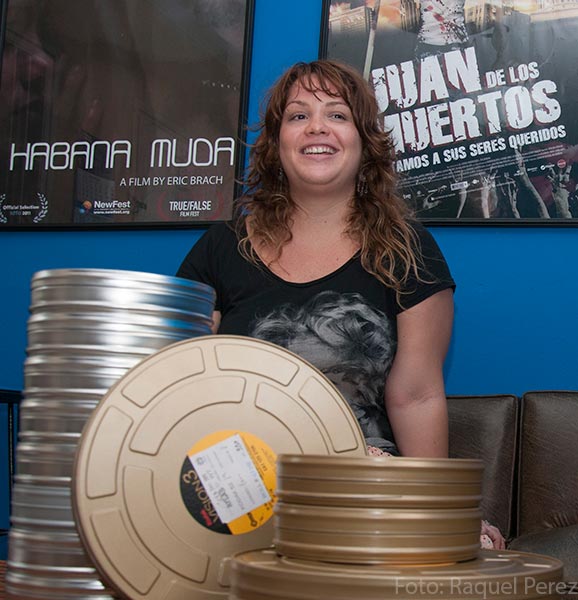
Claudia Calviño, independent producer in Cuba. (Photo Raquel Pérez)
Two feature films and a short film by an independent producer did not get permits despite having the necessary financing to start filming. The denial was issued by the Ministry of the Interior (MININT in Spanish), the entity that for several months has been reviewing the scripts and the composition of the technical teams for cinematic projects being developed on the island.
Previously, the Cuban Institute of Cinematographic Art and Industry (ICAIC in Spanish) and the Ministry of Culture were responsible for the review and approval of the scripts.
To demonstrate their discontent with the new measure, several filmmakers sent a letter to ICAIC and the Ministry of Culture. Jorge Perugorría, prominent Cuban filmmaker and star of the film “Fresa y Chocolate” [Strawberry and Chocolate], said [es] there was “a common opinion” among artists that no agency other than the ICAIC or the Ministry of Culture should revise the stories to be filmed.
In statements to the Spanish daily newspaper, El País [es], Perugorría added that “making movies is still somewhat difficult in Cuba, especially in a crisis because the government prioritizes other things.” However, “thanks to digital media and the ability to make low-budget films, seven or eight a year are still made within a very interesting independent cinema, which can be seen in the sampling from this budding cinema.”
Meanwhile, the independent producer Claudia Calviño added the high costs to obtain permits to film in certain parts of the country to the limitations that currently hinder Cuban cinema. “The Office of the City Historian imposes fees of 500 CUC [Cuban convertible peso] per hour of shooting in the historic center of Old Havana,” Calvino said. According to filmmaker Enrique Alvarez, the statement will not be made public. Alvarez said:
es una declaración que hemos hecho a través de nuestras instituciones, porque nos interesaba que nuestras instituciones fueran las que defendieran su espacio institucional de ser quienes den o no este tipo de permiso, como ha sido hasta ahora. Y a nosotros nos tocaría ya discutir con ellos y fajarnos con ellos cada vez que den un permiso o no.
It’s a statement that we’ve made through our institutions, because we wanted our institutions to be the ones who defended their institutional place to be the ones who give or don’t give this type of permit, as it has been up until now. And it would be up to us to discuss or fight it out with them every time they give or don’t give a permit.
In the recently concluded meeting of the Union of Writers and Artists of Cuba, Álvarez noted [es]:
nunca como hoy la producción cinematográfica se ha extendido por todo el país. Documentales, largos y cortos de ficción se realizan en cualquier rincón con la calidad profesional suficiente como para representar a nuestra cinematografía.
Today like never before, film production has spread across the country. Documentaries and fiction both short and long are made in every corner, with enough professional quality to represent our cinematography.






